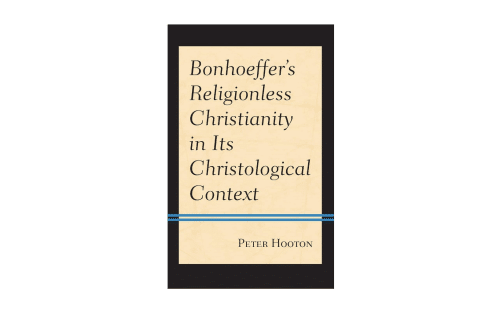You are currently browsing the tag archive for the ‘religionless Christianity’ tag.

The Battle for Bonhoeffer
Debating Discipleship in the Age of Trump
by Stephen R. Haynes
Eerdmans, 208 pp., $19.99
You can tell a lot about people by their heroes. After all, people model themselves after their heroes—and sometimes model their heroes after themselves.
That’s the basic premise of Stephen R. Haynes’s The Battle for Bonhoeffer: Debating Discipleship in the Age of Trump. Dietrich Bonhoeffer, a German Lutheran pastor and theologian executed in 1945 at the age of 39 for joining a plot to assassinate Adolf Hitler, lives on today as a hero for American Protestants across political and confessional boundaries. Different readers and biographers of Bonhoeffer have made different things of him—so strikingly different that in 1964 theologian Harvey Cox famously called Bonhoeffer “a veritable Rorschach test.”
Bonhoeffer wasn’t always a hero for American evangelicals. For two decades after his death, his legacy was the near-exclusive domain of liberal theologians attracted to the concept of “religionless Christianity” that Bonhoeffer developed while on death row. For those so-called “death-of-God” theologians, he was a prophet of a happy future in which Christianity would outgrow many of its traditional beliefs and practices. Needless to say, fundamentalist and evangelical Christians were unamused.
But as death-of-God theology started to, er, die out, the growing evangelical movement began to claim Bonhoeffer as one of its own. New interpretations of Bonhoeffer and his ideas emerged in the 1980s and ’90s. Haynes sorts these into four types: Bonhoeffer as a “Critical Patriot” showing liberal Protestants how best to critique their own government; Bonhoeffer as a “Righteous Gentile” whose advocacy for Jews models Jewish-Christian relations to this day; Bonhoeffer as a “Moral Hero” whose ecumenical battle for conscience transcended particular religious traditions; and the “Evangelical Bonhoeffer” whose Bible-believing Christianity can be weaponized in today’s cultural battles.
Each new Bonhoeffer has required more abstraction than the last—and because each has relied heavily on the broad outline of his life (and, more importantly, the story of his death) for symbolism of heroism and holiness, the actual details of his life and his writings have taken a back seat. It wasn’t Bonhoeffer’s theological ideas but the model of his self-sacrifice that demanded emulation, asking of every American, as Haynes puts it, “What are you doing to arrest this ongoing assault on innocent life?” As for which “ongoing assault,” well, that’s up to the reader. In recent decades, Bonhoeffer’s example has inspired right- and left-leaning Americans alike, all insisting that if Bonhoeffer lived today he would be on their side. Haynes documents Bonhoeffer’s postmortem crusades against abortion, the Iraq War, President Bush, President Obama, and finally, Hillary Clinton and Donald Trump.
In this back-and-forth deployment of Bonhoeffer’s legacy, Eric Metaxas’s bestselling 2009 biography Bonhoeffer: Pastor, Martyr, Prophet, Spy has a special place. Metaxas’s book and his subsequent attempts to employ Bonhoeffer to critique the Obama administration are significant not so much for changing anyone’s view of its subject but for amplifying the “Evangelical Bonhoeffer” in its public role. Dismissing prior Bonhoeffer scholarship as “a terrific misunderstanding,” Metaxas made a Bonhoeffer from scratch, one who (as evangelical reviewer Andy Rowell put it) “looks a lot like an American evangelical—an extraordinarily courageous American evangelical.”
Thanks in large part to Metaxas, the phrase “Bonhoeffer moment” became a powerful call to arms, especially for politically conservative Protestants. And as Bonhoeffer’s symbolic importance grew, the need for facts, either about him or about present realities, diminished. In the battle over religious liberty, for example, Haynes notes that evangelical leaders used the phrase “Bonhoeffer moment” almost without context. “Elaboration was unnecessary,” he explains, “because these leaders shared with their audiences an intuitive understanding of the expression.” The fact that the real Bonhoeffer might have disagreed strenuously with any number of the uses to which his name was being put doesn’t matter in the least.
At this point in the book, it looks like Haynes is about to ask why: Why do we still tie our political disputes today to the (usually far more dramatic) struggles of the last century? Why do the real details of those times matter so little to those who invoke them today? Why do our causes need to piggyback on the credibility of older ones?
But Haynes doesn’t ask. Instead, his narrative and argument collapse into the very misuses of Bonhoeffer that he criticized in the first half of the book. His analysis of the Supreme Court’s Obergefell decision about same-sex marriage struggles to retain scholarly neutrality, and the closer the story gets to the 2016 election, the more it relies on personal views and anecdotes.
By the end, Haynes’s scholarly project is altogether abandoned.








 Today’s guest post is by Prayson Daniel. Prayson, who blogs at
Today’s guest post is by Prayson Daniel. Prayson, who blogs at 
Recent Comments